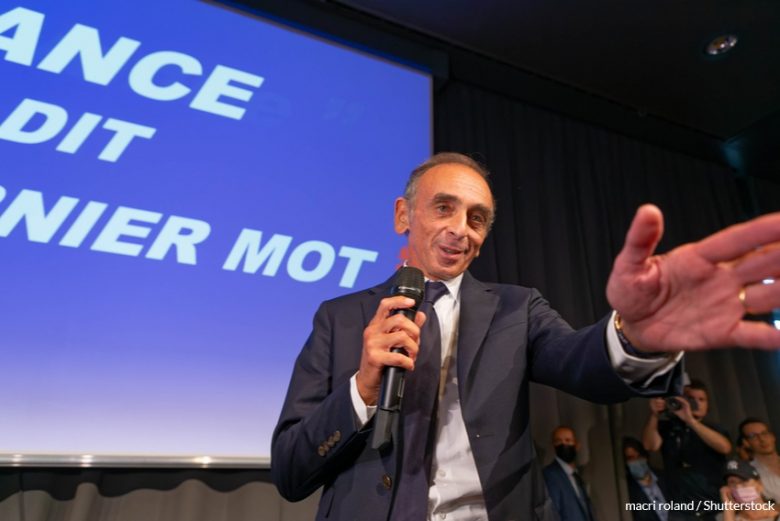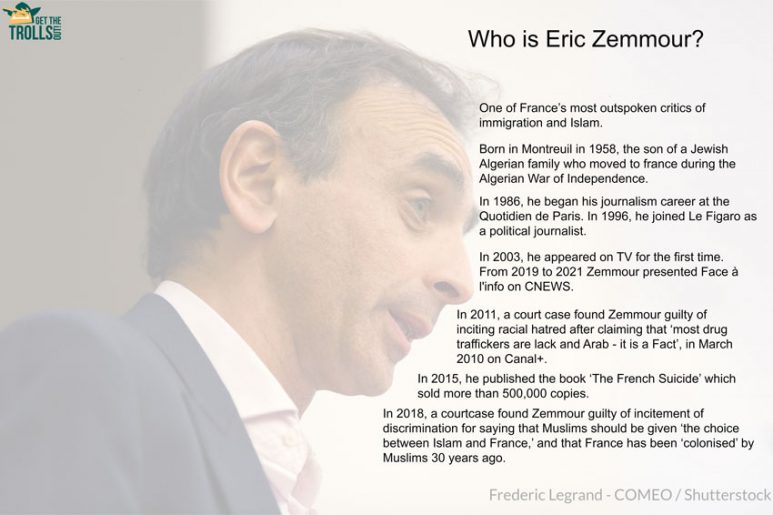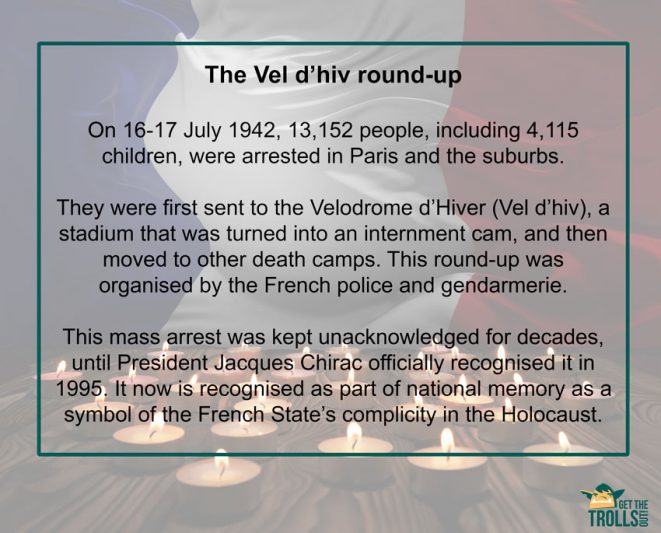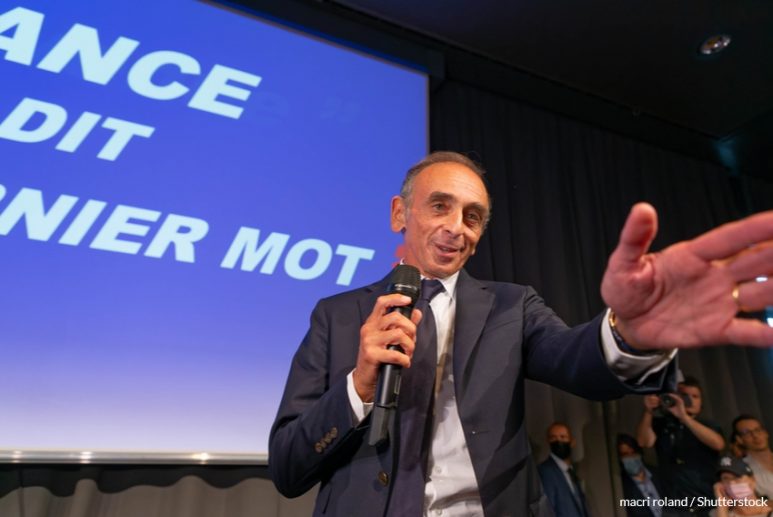This article was initially published on Get The Trolls Out and is part of the project’s Dig Deepper series.
By Giulia Dessi
@G_Zazie
Eric Zemmour, the French far-right agitator, known for his anti-immigration and anti-Muslim views, continues to appear regularly on television. A possible presidential candidate, Zemmour’s anti-immigration and anti-Muslim remarks are increasingly reaching mainstream audiences.

Interviewed on the France 2 TV programme “On est en direct” on the 20th anniversary of the 9/11 attacks, Zemmour said that, if elected, he would ban foreign-sounding names such as Mohamed. Although his attacks could include any name whose origin is not “French”, his idea of assimilation is particularly damaging to French Muslims. “Giving a first name that is not French to your child is to detach yourself from France and continue the Islamic identity in France”, Zemmour said in 2016 during the TV programme “C à vous”, fostering the false myth of incompatibility of French and Muslim identity.
Eric Zemmour has made a career out of anti-immigration and anti-Muslim provocations like these. His outrageous statements, which leverage on prejudices and fears existing within a part of the population, have become part of the country’s national political debate. And his visibility in the country’s media has made it possible for Zemmour to seriously consider his candidacy as a presidential runner. Earlier this year, after the regional elections in June, posters calling for the commentator’s candidacy for the 2022 presidential elections appeared plastered in 86 departments across the country.
Until last month, Zemmour was a regular presenter and commentator on the primetime daily TV show “Face à l’info” on CNEWS. Then, on 9 September, the French media regulator CSA ruled that Zemmour is now a political actor, which means that when it comes to his appearances and contributions, audio-visual media providers should respect the country’s 1986 media law to guarantee political pluralism.

Although the essayist was removed from “Face à l’info”, other current affairs programmes continue to invite him as a guest, knowing that his many provocations and outrageous remarks will increase audience ratings. On 26 September, two weeks after his remarks on banning foreign-sounding names, Zemmour was on the programme “Grand Rendez-Vous” on Europe 1 in partnership with CNEWS and Les Echos. On this occasion, he said: “we have to re-make French people […] It is possible to come from anywhere in the world and become French, but you cannot become such until there is assimilation”. His nationalistic understanding of assimilation, premised on the repression of religious and cultural difference, prompted a mixed reaction of amusement and shock from his interviewers.
Under the presidency of Emmanuel Macron, xenophobic discourses have increasingly become more mainstream. Public statements and policies implemented by the French government (such as the accusations of Islamo-leftism, and police violence against refugees and racialised minorities) show how some views that are traditionally associated with the far right have been permeating attitudes and positions across the wider political spectrum.
Zemmour’s hard-line views on immigration and Muslims are seen as being to the right of Marine Le Pen’s – the leader of the far-right National Rally party. But if Le Pen has tried to moderate the extremist tendencies of party members (at least in appearance), Zemmour has not. And for this reason, he is attracting the liking of those who feel Le Pen has “softened up” too much. While Zemmour is touring France to promote his latest book “France Has Not Said Its Last Word Yet”, and contemplating a run for president, polls are predicting he would get 15% of the votes – only 1 percent lower than Marine Le Pen.
Zemmour’s outrageous remarks do not concern only migration and Islam. In the same interview on Europe 1, the commentator expressed revisionist views on the Holocaust and France’s participation in it. Specifically, Zemmour said that France did not participate in the extermination of Jews and that the Vichy regime – the French government under Marshal Pétain, which collaborated with the Nazi invaders – did not have exterminations as an objective. “Vichy has protected French Jews and gave foreign Jews (to the Nazis)”, Zemmour said. To defend France by saying that it only “gave foreign Jews” is not only historically false, but also justifies the heinous act of giving anyone to the Nazis. There is much historical research, supported by evidence, that the Vel d’hiv round-up, which Zemmour used as an example, was a mass arrest of Jewish families organised by the French police and gendarmes in 1942.

Zemmour’s re-interpretation of historical facts related to the Holocaust and World War II seems to constitute the offence of Holocaust denial, as it downplays and denies the deliberate plan to exterminate the Jewish population of Europe. In October 2019, during a TV debate on CNEWS, he made the same claim – that the collaborationist government of Marshal Pétain saved many French Jews – prompting indignation from historians and Jewish organisations, as well as a court case. He was acquitted due to the ambiguity and the context of his wording, but his denial of French complicity in the Holocaust is blatant. The case will be retried in front of the Paris Court of Appeal.
Commenting at that time, Licra’s president Mario Stasi, highlighted how Zemmour’s provocations had been hitting the headlines for days and that this was exactly his goal. Historians have researched and demonstrated with detail that the regime of former Marshal Pétain handed the Jews over to the Nazis to exterminate them, “but I must also ask myself about the responsibility of this information channel in this rhetoric of misinformation. […] The most serious thing is the responsibility of the media, who echo this rumour […] by Eric Zemmour,” wrote Stasi.
Zemmour is a proficient user of social media, but it is his TV appearances that have propelled him into the mainstream, generating a cult following of right-wingers. As the presidential polls approach, the visibility of his anti-Muslim and revisionist ideas will likely increase. It is the responsibility of broadcast journalists to hold these views to account, but when ratings take prevalence over journalistic integrity, sensationalist bigotry becomes the norm.
Photo Credits: macri roland / Shutterstock

